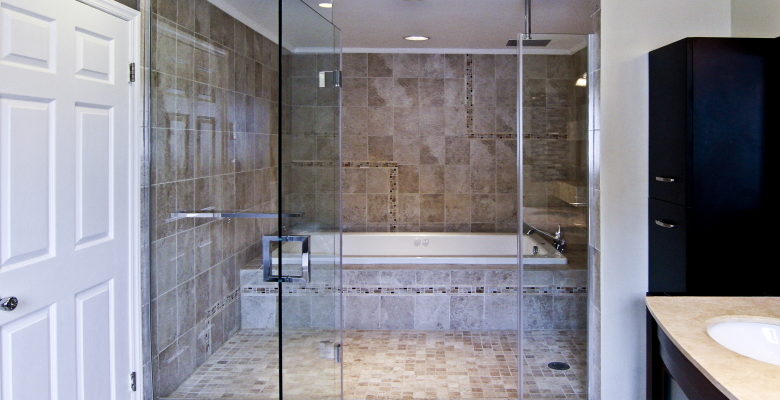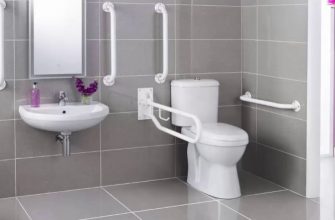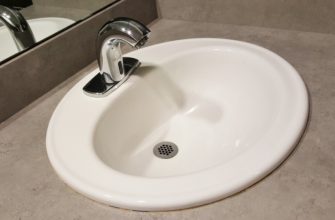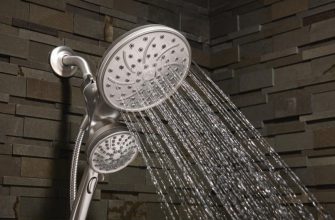Keeping your shower doors in good working order is important for ensuring a pleasant and functional showering experience. However, over time wear and tear can take its toll, leading to issues like leaks, broken hardware, and damage to the glass itself. Thankfully, many common shower door problems can be addressed with simple DIY repairs if caught early. For more complex issues, bringing in a professional may be your best bet.
In this complete guide, we’ll walk through the basics of shower door maintenance. We’ll look at how to assess damage, tackle quick fixes yourself, determine when to call a pro, and learn tips to prevent future issues from cropping up. Understanding potential problems, repair options, and proper care is key for extending the life of your shower doors and avoiding costly replacements down the road.
- Understanding the Importance of Shower Door Maintenance
- Common Issues with Shower Doors
- Identifying Types of Shower Door Damage
- Cracks and Chips
- Leaking
- Hinges and Hardware Issues
- Mold and Mildew Buildup
- Stains and Discoloration
- Assessing the Damage
- Identifying Types of Shower Door Damage
- Evaluate the Damage Root Cause
- Assess DIY Abilities
- DIY Shower Door Repairs
- Tools and Materials Needed
- Repairing Small Cracks and Chips
- Sealing Leaks
- Adjusting Hinges and Hardware
- Removing Mold and Mildew
- Dealing with Stains and Discoloration
- Professional Repair and Maintenance Options
- Hiring a Professional for Complex Repairs
- Regular Maintenance Services
- Upgrading and Replacing Old Doors
- Preventive Maintenance Tips
- Cleaning and Care Practices
- Avoiding Common Mistakes
- Protecting Against Future Damage
- Final Thoughts on Shower Door Repair and Maintenance
Understanding the Importance of Shower Door Maintenance
It’s easy to overlook shower door maintenance until an issue pops up, but being proactive protects your investment and prevents bigger headaches. Water, moisture, and daily wear and tear through regular use can lead to damage over time if not properly addressed. Catching minor problems early makes repairs simpler.
Neglecting basic care also allows existing damage to expand. A small crack in the glass that isn’t sealed can spiderweb into a much larger crack. Leaks around the edges of the door can lead to water getting into the walls, potentially causing mold issues. Letting hardware issues go can affect the functionality and structural integrity of the entire door.
Basic cleaning is important too. Soap scum, mildew, and mineral deposits from water can stain and corrode surfaces when left to build up. Keeping your shower doors clean not only maintains an appealing look but helps components last longer.
Overall, staying on top of maintenance protects the glass, seals, hardware and framework of your shower doors. This saves you money over time and extends the life of your existing doors before needing replacements.
Common Issues with Shower Doors
There are several common shower door problems homeowners encounter. Being able to identify issues can help you effectively address them before they worsen:
Identifying Types of Shower Door Damage
Cracks and Chips
It’s not uncommon for cracks and chips to form in glass shower doors over years of use. Opening and closing, improper cleaning, objects hitting the door, or even changes in temperature can cause the glass to crack. Tiny fractures usually start minor but spread if left untreated.
Leaking
Leaks typically happen when seals around the edges of shower doors fail. Factors like age, hard water mineral buildup, moisture damage, and tension on the seals can cause leakage. A leak indicates a gap that needs to be resealed to prevent water escaping.
Hinges and Hardware Issues
Loose or damaged hinges and hardware can affect the functionality of shower doors. Issues like loosening screws, broken handles, bent frames, or misaligned tracks usually stem from simple wear and tear, corrosion, loose installations, or forced openings/closings.
Mold and Mildew Buildup
The warm, humid environment of a shower makes it prone to mold and mildew growth. Allowing moisture, soap scum and minerals to sit leads to unsightly and potentially hazardous buildup. Routine cleaning is key for prevention.
Stains and Discoloration
Hard water stains, soap scum build up, mildew, and mineral deposits from water can cause stains and discoloration on glass shower doors and hardware. These diminish aesthetics if left to sit.
Being able to recognize common shower door issues allows you to pinpoint appropriate repairs. Knowing potential causes also helps prevent recurrence going forward.
Assessing the Damage
Before attempting to fix any shower door issue, it’s important to thoroughly assess the damage first. This allows you to understand the extent of the problem and determine if it’s a DIY repair or better left to a professional.
Identifying Types of Shower Door Damage
Start by identifying the type of damage. Ask yourself:
- Is the glass cracked or chipped anywhere? Note size and location.
- Are there any leaks or gaps allowing water to escape? Check all seals.
- Do the hinges, handles or rollers have issues opening/closing the door? Test functionality.
- Is there mold, mildew or heavy soap scum buildup? Check all surfaces.
- Are there difficult stains or mineral deposits? Determine the source.
Also note if there are any other signs like wood rot or water spots around surrounding walls. This signals water has been escaping for some time.
Evaluate the Damage Root Cause
Determining what caused the damage is also helpful for preventing repeat issues. Consider factors like:
- Age and normal wear from regular use over time.
- Forced or improper openings that strained hinges.
- Objects hitting or bumping the glass.
- Hard water stains and mineral deposits building up.
- Leaks allowing moisture behind glass or into walls.
- Previous improper installation.
Pinpointing the damage root often requires some deduction. Regardless, understanding cause aids in full repairs and prevention.
Assess DIY Abilities
Finally, assess whether the shower door issue falls within your DIY comfort zone or if it requires a professional. There are quick fixes like sealing minor cracks, replacing loose screws, or removing mold and mildew that homeowners can tackle. However, more complex repairs like replacing entire glass panels, doors or fittings may warrant a specialist.
DIY Shower Door Repairs
Many common shower door repairs can be completed yourself at home. This saves money over calling a handyman or glass specialist. For DIY repairs, make sure you have the proper materials and follow safe, careful procedures.
Tools and Materials Needed
Gather supplies ahead of time. Having what you need on hand allows you to fully complete repairs in one go. Typical items include:
- Safety gear: gloves, eye protection, knee pads, etc.
- Sealant: clear waterproof silicone or acrylic caulk.
- Cleaners: vinegar, dish soap, hydrogen peroxide, etc.
- Scrub brushes, microfiber cloths, sponges.
- Grout sealer.
- Replacement hardware: hinges, screws, handles.
- Glass polish.
- Wood filler, wood screws, wood finishing products.
Repairing Small Cracks and Chips
For stable cracks under 6 inches, carefully clean out debris and seal with a waterproof silicone caulk. First, wear gloves and safety glasses for protection. Carefully clean out any dirt or debris from the crack using a toothbrush or tweezers. Wipe the area clean.
Apply painter’s tape along the crack to keep the caulk neat and in place. Cut the tip of the caulk tube at a 45-degree angle for easier application. Slowly apply a steady bead of silicone caulk along the crack, smoothing as you go. Aim to slightly overfill then use a plastic spreader or old gift card to smooth it flat with the surrounding surface.
Allow the caulk to cure for at least 24 hours without water exposure. Carefully remove the tape once dry. Be extremely gentle with the repaired crack for the first few weeks since the seal will still be curing and gaining strength over time.
Sealing Leaks
Check all sides of shower door frames for gaps allowing water to leak through. Leaks most often happen where the door frame meets walls, glass panels, or the shower base. If you spot gaps, moisture damage, or see active dripping, it needs to be sealed.
Thoroughly clean and dry the area first. Apply painter’s tape parallel to the gap, lining both sides to protect surfaces and ensure straight caulk lines. Carefully caulk using a waterproof silicone. Smooth the bead with a plastic spreader, overfilling slightly. Allow to fully cure for at least 24 hours, then remove tape.
Be sure to check seals regularly when cleaning your shower doors. Reapply caulk if you notice any new gaps or leaks forming.
Adjusting Hinges and Hardware
If shower doors are difficult to open or close, sticking, or not aligning properly, hinges and hardware likely need adjustment. Basic fixes involve tightening loose screws, lubricating rollers/tracks, replacing worn parts, and realigning door position.
Start by fully inspecting all hinges, handles, tracks and rollers. Tighten any loose screws with a screwdriver. Clean dirty tracks then use silicone spray to lubricate rollers and parts for smooth gliding. Replace any severely worn rollers, bearings or broken handles.
If doors are misaligned, gently loosen frame screws and shift the whole door to realign in the tracks. Re-tighten screws when properly positioned. Adjusting the door height and angle this way allows proper clearance and operation.
Removing Mold and Mildew
Mold and mildew need to be addressed quickly once noticed to prevent spreading and damage. Combining non-toxic cleaners with some elbow grease easily removes most buildup.
Mix a spray solution of equal parts white vinegar and water plus a couple drops of dish soap. Generously spray the mixture over moldy areas then let it sit 5-10 minutes to penetrate. Scrub with a stiff nylon brush, wiping away residue as you work. Rinse clean when finished.
For more stubborn areas, make a baking soda paste. Sprinkle baking soda over the mildew and lightly spray vinegar over top until it bubbles. Let sit briefly before scrubbing. Rinse clean. Repeat if needed for full removal.
Be sure to keep shower doors very clean and dry moving forward to prevent recurrence. Promptly squeegee after showering and leave doors open to air out.
Dealing with Stains and Discoloration
Hard water stains, soap scum buildup and mildew can stain glass and hardware over time. Tackling staining as soon as noticed makes removal much simpler. Be sure to protect nearby surfaces.
For glass, make a paste from baking soda and water. Apply to stained areas then lightly scrub with a soft cloth. Rinse clean. For more stubborn glass stains, use white vinegar instead, following the same process. Never use harsh chemicals on glass or it can scratch.
For metal and plastic hardware, make a paste from baking soda and hydrogen peroxide. Gently rub over stains, allowing it to bubble, then rinse. Vinegar works similarly. For final polishing, use a glass cleaner.
Getting into a regular cleaning routine helps prevent future staining issues from building up over time on your shower doors and hardware.
Professional Repair and Maintenance Options
While many shower door repairs can be done as DIY projects, there are some issues best left to the pros. Knowing when to call a professional ensures proper repairs and safety.
Hiring a Professional for Complex Repairs
If you have a shattered panel, significant leaks, major hardware damage or failures, adjustments beyond your skill level, or simply feel uneasy tackling it, hire help. Attempting intricate shower door repairs without expertise can result in injury or further damage.
A professional glass company has the tools, materials and skills to properly replace glass, reseal leaks, realign doors and frames, replace entire components, or install new doors. They can also determine if underlying issues like framing cracks or loose installations caused the problem.
Regular Maintenance Services
Many glass companies offer regular shower door maintenance packages in addition to repairs. This involves thorough deep cleaning, hinge and hardware adjustments, caulking seals, and other proactive care every 6-12 months.
Investing in professional maintenance helps catch minor issues before they become big problems. It also keeps doors looking their best, extends hardware lifespan, and ensures proper functionality.
Upgrading and Replacing Old Doors
If your shower doors are outdated or sustain damage beyond reasonable repair, a full replacement may be best. Glass professionals can recommend replacement options that address underlying issues, fit your space properly, and provide advanced features.
New shower door models offer better watertight seals, smoother openings/closings, and easier cleaning maintenance. Investing in a full replacement can pay off down the road by enhancing your whole shower experience and reducing future issues.
Preventive Maintenance Tips
While repairs address current shower door issues, prevention is key for avoiding problems down the road. Practicing good care and avoiding common mistakes helps maintain functionality and aesthetics.
Cleaning and Care Practices
Get into consistent cleaning habits to lower damage risks:
- Rinse soap film after each use.
- Squeegee water off glass doors and walls.
- Wipe seals with microfiber cloth after showering.
- Use vinegar spray weekly to prevent soap scum buildup.
- Clean rollers/tracks monthly to keep sliding smoothly.
- Inspect seals every few months for gaps needing re-caulking.
Establishing solid cleaning, drying and inspection practices makes shower door care quick and prevents issues.
Avoiding Common Mistakes
Being mindful of a few key things also lowers damage risks:
- Don’t force stuck doors which can strain hinges.
- Keep metal tools away from glass when cleaning.
- Ensure children or pets don’t hit the glass.
- Check for underlying leaks from faulty seals.
- Use non-abrasive cleaners to avoid scratching.
Avoiding these common missteps helps your shower doors stay crack-free and fully functional for longer.
Protecting Against Future Damage
You can also be proactive by adding safeguards:
- Apply protective film on glass to absorb impacts.
- Install bumpers on handles to prevent forceful openings.
- Use a shower door lubricant to improve gliding.
- Consider frameless or partially-framed doors which have less hardware issues.
Protecting your investment with preventive precautions reduces the likelihood of needing repairs.
Final Thoughts on Shower Door Repair and Maintenance
Catching minor shower door issues early and performing basic maintenance makes owning glass doors much simpler. Understanding what causes common problems also allows you to be proactive against damage.
While DIY repairs are suitable for simple fixes, don’t hesitate to call a professional for complex issues or replacements. Investing in professional maintenance check-ups and upgrades can also save money and hassle over time.
With some diligent preventive care, your shower doors can stay looking great and function properly for years before needing major repairs. Establishing good cleaning habits and being gentle in use helps minimize wear. Consider adding safeguards like bumpers and protective film too.
Knowing your DIY abilities, assessing issues promptly, and caring for your investment keeps shower doors operating their best. Stopping small problems before they spread into bigger headaches reduces frustration and costly replacements down the road. With a few basic maintenance practices, you can confidently handle shower door care.









